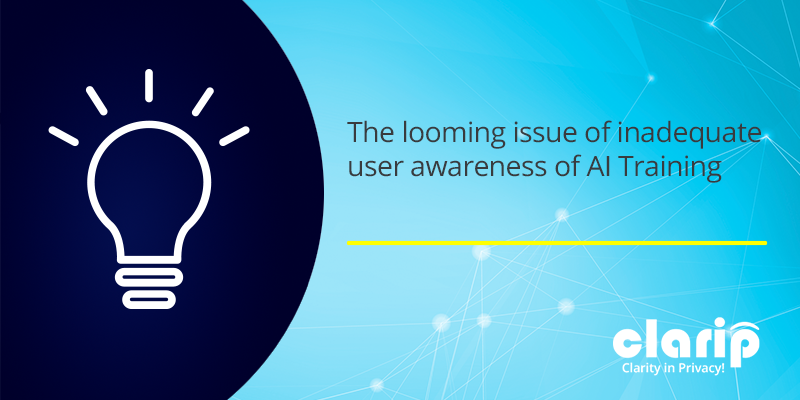The Looming Issue of Inadequate User Awareness of AI Training

In recent years, artificial intelligence (AI) has woven itself intricately into the fabric of users lives. There’s a concerning trend that is only being unraveled now. AI is everywhere and companies are not adequately informing users about AI training. As AI technologies continue to proliferate, it’s crucial to shed light on this issue, highlight the potential consequences of keeping users in the dark and the steps needed to bridge the information gap.
Suspicious AI training activities by communications platforms
Zoom updated its terms of service – “Zoom terms of service now require you to allow AI to train on ALL your data — audio, facial recognition, private conversations — unconditionally and irrevocably, with no opt out…”. These updates seemingly appeared to grant the platform the unlimited ability to use customer data to train AI models. Immediately there was consumer backlash, and Zoom was forced to attempt a reversal. In a blog post Zoom explained “Zoom does not use any of your audio, video, chat, screen sharing, attachments or other communications-like Customer Content (such as poll results, whiteboard and reactions) to train Zoom or third-party artificial intelligence models.” However, this still doesn’t completely make sense. If account owners want to use Zoom’s experimental AI tools, IQ Meeting Summary and IQ Team Chat Compose, they now must provide consent before starting a meeting using these tools, additional participants are only presented with two options: accept the terms and join the meeting or reject them and leave the meeting.
Meta announced that they will use Facebook data to train its large language model Llama 2. Meta’s privacy policy generative AI models’ section explains that Meta will use publicly available information “as well as information from its products – Facebook, Threads, and Instagram – to train its generative AI services. The only way users could prevent this is if they deleted their account 90 days ago before Meta announced that they will be using their data!
The Black Box Conundrum
AI training, which lies at the heart of machine learning, can be a complex and abstract concept for the general public. However, this complexity is often exacerbated by companies that present their AI systems as enigmatic black boxes – products of mysterious processes that defy explanation. While these black boxes can deliver impressive results, they hinder transparency and understanding.
Imagine handing over the wheel of your car to an autonomous driving system without knowing how it makes decisions. Such opacity is a disconcerting reality with many AI applications, from recommendation algorithms that shape your online experience to chatbots that assist customer service interactions. Users are increasingly interacting with AI-driven tools, but their lack of insight into the systems’ inner workings leaves them vulnerable to biases, errors, and unintended consequences.
The Implications of Inadequate Information
- Bias Amplification: AI systems learn from historical data, and if that data is biased, the system can inadvertently perpetuate and amplify those biases. Without clear information about the training data and methodologies, users are oblivious to the potential biases that might influence the AI’s outputs.
- Unforeseen Errors: AI models, like any technology, are not infallible. Inadequate user awareness means that when AI-driven decisions go awry, users are left perplexed and without the means to comprehend what transpired.
- Ethical Dilemmas: The lack of transparency in AI training also raises ethical concerns. Users might unknowingly contribute to training data without realizing the implications of their data sharing, especially when it concerns personal or sensitive information.
- Limited Accountability: In cases where AI systems make erroneous or biased decisions, it’s challenging to hold anyone accountable when users lack a basic understanding of how these systems function.
Bridging the Information Gap
- Transparency Initiatives: Companies should take proactive steps to provide accessible and comprehensible explanations of how their AI systems work. This could involve user-friendly documentation, visualizations, and educational resources that demystify the AI training process. Include AI training process in your privacy policy, and provide an opportunity to opt out before collecting data.
- Ethical Considerations: Companies must openly acknowledge and address the ethical concerns surrounding their AI applications. Transparency about data sources, bias mitigation efforts, and decision-making mechanisms can help users make informed choices.
- User Education: Empowering users with knowledge is essential. Initiatives that promote digital literacy and AI awareness can help users navigate the digital landscape with greater confidence and understanding.
- Regulatory Frameworks: Governments and regulatory bodies play a crucial role in setting standards for AI transparency. Regulatory bodies are developing and enforcing regulations that mandate adequate user education and can push companies to prioritize transparency.
Transparency in AI Training
Fostering trust between users and AI systems is paramount. Transparency and trust require shedding light on the enigmatic AI training processes that currently lie behind closed doors. Companies must recognize the importance of educating their users, not only about the benefits of AI but also about its limitations, potential biases, and decision-making frameworks. By advocating for transparency, accountability, and informed decision-making, companies can pave the way for a future where users engage with AI technologies with eyes wide open.
Clarip’s Data Privacy Governance Platform ensures transparency with users and compliance with all consumer privacy regulations. Clarip takes data privacy governance to the next level and helps organizations reduce risks, engage better, and gain customers’ trust!
Contact us at www.clarip.com or call Clarip at 1-888-252-5653 for a demo.
Email Now:
Mike Mango, VP of Sales
mmango@clarip.com
Related Content:
Making the Case for Data Minimization
Automated Data Mapping
Data Discovery
Looking for Product Data Sheets?

 Data Risk Intelligence
Data Risk Intelligence Automated Data Mapping
Automated Data Mapping Do Not Sell/Do Not Share
Do Not Sell/Do Not Share Cookie Banner Solutions
Cookie Banner Solutions Consent & Preferences
Consent & Preferences Data Rights Requests
Data Rights Requests
